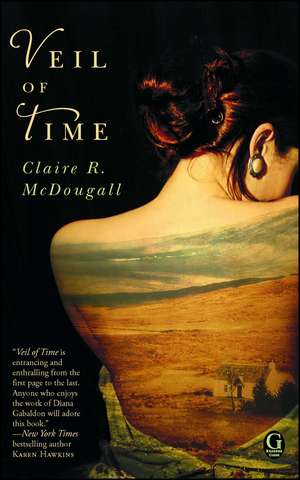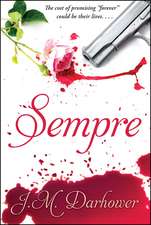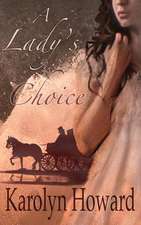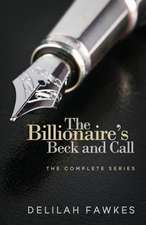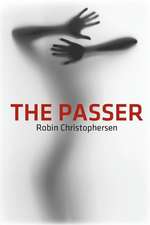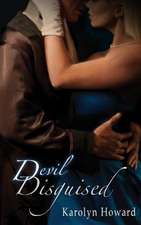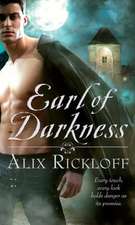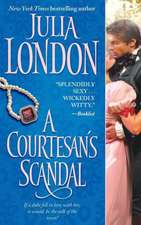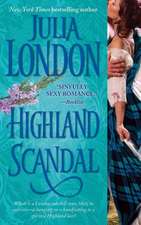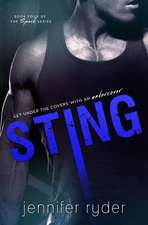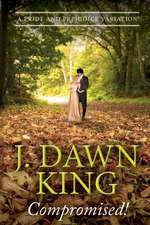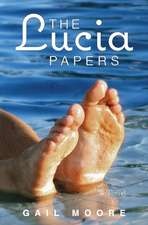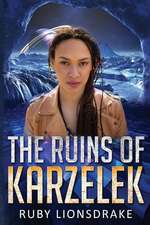Veil of Time
Autor Claire R. McDougallen Limba Engleză Paperback – 9 oct 2014
Maggie slips into the eighth century during a seizure and finds herself back in Dunadd's heyday, but it seems more than just a dream. The druidess in her hut at the top of the fort seems more real than the witches Maggie is writing about in her thesis. Fergus, the handsome brother of the king, certainly seems more than an illusion when he reaches for her. And his daughter Illa could be Ellie's double returned to life over a millennium before her birth. As Maggie keeps returning to Fergus's world, her surgery approaches, and soon she'll be forced to make an impossible choice: return to her son in the present or make a new life with Fergus and Illa in the past.
Preț: 49.08 lei
Nou
Puncte Express: 74
Preț estimativ în valută:
9.39€ • 10.04$ • 7.83£
9.39€ • 10.04$ • 7.83£
Carte disponibilă
Livrare economică 28 martie-09 aprilie
Preluare comenzi: 021 569.72.76
Specificații
ISBN-13: 9781451693812
ISBN-10: 1451693818
Pagini: 416
Dimensiuni: 135 x 210 x 28 mm
Greutate: 0.36 kg
Editura: Gallery Books
Colecția Gallery Books
ISBN-10: 1451693818
Pagini: 416
Dimensiuni: 135 x 210 x 28 mm
Greutate: 0.36 kg
Editura: Gallery Books
Colecția Gallery Books
Notă biografică
Claire R. McDougall, a native of Scotland, graduated from Oxford University and lives now in Aspen, Colorado, with her family. After an early start as a newspaper columnist, her career in creative writing moved through the genres of poetry and short stories to settle on Scottish novels.
Extras
Veil Of Time
![]()
Long before my affliction was given a name, I was having dreams. Not passing dreams, but dreams in deep sleep that weave themselves into the fabric of your mind and won’t let go. Even in bed beside Oliver Griggs, it wasn’t Griggs I was dreaming about, but Robert Burns or Robert the Bruce or William Wallace. I was there, not stretched out like a corpse beside my husband, but in the bracken or in the shelter of a stone house with thatch and a fire. I watched Burns with his head on his desk after a night of brawling coming round slowly to lift his pen; it was me in the trees, running from the English with my hand in the hand of the Wallace.
So, I know how to get away. Don’t think I don’t. I know, but I can’t control it. An affliction buried in my genes is the gate, and I have no way of choosing when I get to go through. Not very often, is the answer, not even as often as the seizures, because they don’t always end in sleep.
I got away eventually from Professor Griggs. The dreams were too much for him.
“You always seem a bit removed,” he said once, peering at me over his glasses like the teacher he is. “I’m not even sure if we inhabit the same world.”
Oliver married me before he really knew what it meant to have to depend on phenobarbital to keep your day on a smooth path.
I tried to live in his world, tried the “normality” game as far as it would go. On the day of our wedding, I took twice the number of seizure pills, just to make sure I could glide through the “I do’s,” and so could Oliver. I suppose he was saving the “I don’ts” for later.
I married Griggs when he was someone else, before he hung up his jeans for a suit and his ideas for a curriculum. The years sort of flattened out between us, the endless days of child minding, the meetings and schedules at the university, the children who came and went, each in his or her different way.
Because she was there once, my daughter, my Ellie. She was there, and now I have no way of getting to her, whether through the fog or dreams; she is gone. My son, Graeme, took himself off to boarding school after Ellie died. I wasn’t there anymore, and there was no point in his staying. So I left Glasgow, too, sold the house where we’d all lived under the illusion of being something stable and unchanging. But we weren’t. The scene exploded or imploded, at least the center did not hold. After Ellie died, Oliver couldn’t speak to me for weeks, couldn’t actually look at me, open his mouth, and let out a sound. He blamed me, because that gene didn’t stop with me. Ellie died during a seizure, and though everyone knows better, they can’t help feeling I’m at fault, as though I had willed that horrid coil of DNA right into her.
Perhaps Graeme cried with his father, but he never did with me. He pulled up his fifteen-year-old self and said he had to go. We all had to go, so we didn’t argue. His father had already left, perhaps not the house, but he wasn’t there. So, with everyone already gone, Graeme moved to the east coast and I came with my suitcases to Dunadd.
What is this place called Dunadd? It is shades of green and all covered with bracken; it smells of moss and rain pouring for days on end. It is grey stone walls and cloud and bog and black slugs. It is sea and seagull cry, and the rough call of the pheasant. It is all these things and it is not that far from Glasgow, if you are a crow. If you are a bird, you fly high over a treeless mountain pass, over waterfalls and fingers of sea lochs that take a person in a car three hours to drive. Dunadd is a great rock rising out of a wide valley that runs from the hills that encircle it down to the sea at Crinan. It’s not the place it once was, when Crinan was Scotland’s main port, and wine and spices, jewelry and slaves were brought to Dunadd to be traded.
Mornings in my little cottage beneath Dunadd are so quiet now; the clouds are low and drizzling. Glasgow, where I lived another life with a husband and children, has no currency here. My children, who look at me from their picture frames when I awake, are not known here. Neither is Oliver Griggs of the University of Glasgow. Not even Margaret Griggs is known here, because I have unearthed the old Maggie Livingstone of childhood and pasted it over the Margaret I had become.
I wander around Dunadd in a sort of waking dream. There hasn’t been much truck in humans here since the Dark Ages. In those days, when it was easier to travel by sea, there were no roads over the mountains and only foot trails around the lochs. These days there is the A83 from Glasgow all the way to this boggy land populated mostly now by ancient relics: standing stones, burial cairns, middens full of shells and bones.
When everything fell apart in Glasgow, I packaged up my life and drove here with boxes of books and postgraduate research on the witch burnings I had started once upon a time. Being an afflicted one myself, I suppose I felt some empathy with the witches, but I dropped all that when I married and for a while wasn’t feeling like an outcast anymore.
But all things pass, and here I am with my cup of tea in the early morning, in the floral chair by the window looking out at the River Add that winds around the base of Dunadd. I bring my knees to my chest and pull my nightie down over my stockinged feet, watching the peaty red water swirl about the deep places. In the garden at the back of the cottage is a single standing stone to which one end of a washing line has been tied.
Only one other cottage lies alongside the trail up to the top of Dunadd. Except for the older man who lives there and me, the land here is empty of people. At night, there is nothing but the wind and the dark and the memory of the many islands that lie offshore. By first light, the tourists start driving in, to scramble up the path to the summit of this windy seat of the Celts, where the relics of the Pictish, then Celtic, then Viking fort lie in crumbles of tumble-down walls. Not even the archaeologists really know what was up there, because it was all too long ago, and not that long ago since the fort was handed over to the Scottish National Trust by the former feudal lord.
Archaeological digs come in from time to time and take Dunadd’s treasures to the museum at the top end of the valley in the town of Kilmartin. What’s left for the tourists is a Pictish boar carved in the rock, and a footprint where kings once placed their feet in the first coronation ceremonies of Scotland. The tourists smile at the camera with one boot in the stone imprint. They run their fingers along the outline of this early boar, barely visible now, that would eventually become the emblem of Scotland.
But in the evenings, when the sun swoons at the edge of the sea, there is only me on the edge of the windy hill. Up there, there is no sense of pace or life as life has evolved. On the edges of this glen, the Scandinavian firs that were once brought in for profit are slowly turning themselves back to ancient oak forests. Nothing but lorries carrying the last of the timber move fast here now.
You see, there is only one way out of my phenobarbital fog. I’m here at Dunadd for three months, October to January, to look at that thesis on witches again and to await my day of reckoning.
“For your type of epilepsy, Margaret, a lobectomy might be the best solution.” My doctor calls me Margaret, because he comes from my Glasgow life.
I know all this. I know enough about my affliction to understand the dangers to my brain of repeated seizures. I know, because it killed my daughter. And where would Graeme be without a mother? He’s in his last refuge, and I owe him this operation. It’s the last thing I have left to give him. If it all comes out right, perhaps I’ll move to a flat in Edinburgh and become a real mother again. If it doesn’t, then these three months at Dunadd will be the end of Maggie, of Margaret, of me.
I came to this holiday cottage at Dunadd because I used to come here from Glasgow as a child. In those days my seizures were mild and undiagnosed. The nuns at my school used to put me out in the corridor if I had “an episode,” as my mother used to call them. They told her I was just showing off. It took the doctors until I was in my teens to diagnose my epilepsy and then years more for them to bring the seizures under control—more or less.
The holiday cottage was different then, with a musty smell and small poky rooms. New owners knocked down walls, opened up the kitchen into the living room, and turned the windows into sliding glass doors. This is where I sit now with my crumpet and my cup of tea, hurling headlong towards the Day of Lobectomy. I came because I am scared of going forward, and time moves more slowly here. Sometimes at Dunadd time hardly seems to exist at all.
1
Long before my affliction was given a name, I was having dreams. Not passing dreams, but dreams in deep sleep that weave themselves into the fabric of your mind and won’t let go. Even in bed beside Oliver Griggs, it wasn’t Griggs I was dreaming about, but Robert Burns or Robert the Bruce or William Wallace. I was there, not stretched out like a corpse beside my husband, but in the bracken or in the shelter of a stone house with thatch and a fire. I watched Burns with his head on his desk after a night of brawling coming round slowly to lift his pen; it was me in the trees, running from the English with my hand in the hand of the Wallace.
So, I know how to get away. Don’t think I don’t. I know, but I can’t control it. An affliction buried in my genes is the gate, and I have no way of choosing when I get to go through. Not very often, is the answer, not even as often as the seizures, because they don’t always end in sleep.
I got away eventually from Professor Griggs. The dreams were too much for him.
“You always seem a bit removed,” he said once, peering at me over his glasses like the teacher he is. “I’m not even sure if we inhabit the same world.”
Oliver married me before he really knew what it meant to have to depend on phenobarbital to keep your day on a smooth path.
I tried to live in his world, tried the “normality” game as far as it would go. On the day of our wedding, I took twice the number of seizure pills, just to make sure I could glide through the “I do’s,” and so could Oliver. I suppose he was saving the “I don’ts” for later.
I married Griggs when he was someone else, before he hung up his jeans for a suit and his ideas for a curriculum. The years sort of flattened out between us, the endless days of child minding, the meetings and schedules at the university, the children who came and went, each in his or her different way.
Because she was there once, my daughter, my Ellie. She was there, and now I have no way of getting to her, whether through the fog or dreams; she is gone. My son, Graeme, took himself off to boarding school after Ellie died. I wasn’t there anymore, and there was no point in his staying. So I left Glasgow, too, sold the house where we’d all lived under the illusion of being something stable and unchanging. But we weren’t. The scene exploded or imploded, at least the center did not hold. After Ellie died, Oliver couldn’t speak to me for weeks, couldn’t actually look at me, open his mouth, and let out a sound. He blamed me, because that gene didn’t stop with me. Ellie died during a seizure, and though everyone knows better, they can’t help feeling I’m at fault, as though I had willed that horrid coil of DNA right into her.
Perhaps Graeme cried with his father, but he never did with me. He pulled up his fifteen-year-old self and said he had to go. We all had to go, so we didn’t argue. His father had already left, perhaps not the house, but he wasn’t there. So, with everyone already gone, Graeme moved to the east coast and I came with my suitcases to Dunadd.
What is this place called Dunadd? It is shades of green and all covered with bracken; it smells of moss and rain pouring for days on end. It is grey stone walls and cloud and bog and black slugs. It is sea and seagull cry, and the rough call of the pheasant. It is all these things and it is not that far from Glasgow, if you are a crow. If you are a bird, you fly high over a treeless mountain pass, over waterfalls and fingers of sea lochs that take a person in a car three hours to drive. Dunadd is a great rock rising out of a wide valley that runs from the hills that encircle it down to the sea at Crinan. It’s not the place it once was, when Crinan was Scotland’s main port, and wine and spices, jewelry and slaves were brought to Dunadd to be traded.
Mornings in my little cottage beneath Dunadd are so quiet now; the clouds are low and drizzling. Glasgow, where I lived another life with a husband and children, has no currency here. My children, who look at me from their picture frames when I awake, are not known here. Neither is Oliver Griggs of the University of Glasgow. Not even Margaret Griggs is known here, because I have unearthed the old Maggie Livingstone of childhood and pasted it over the Margaret I had become.
I wander around Dunadd in a sort of waking dream. There hasn’t been much truck in humans here since the Dark Ages. In those days, when it was easier to travel by sea, there were no roads over the mountains and only foot trails around the lochs. These days there is the A83 from Glasgow all the way to this boggy land populated mostly now by ancient relics: standing stones, burial cairns, middens full of shells and bones.
When everything fell apart in Glasgow, I packaged up my life and drove here with boxes of books and postgraduate research on the witch burnings I had started once upon a time. Being an afflicted one myself, I suppose I felt some empathy with the witches, but I dropped all that when I married and for a while wasn’t feeling like an outcast anymore.
But all things pass, and here I am with my cup of tea in the early morning, in the floral chair by the window looking out at the River Add that winds around the base of Dunadd. I bring my knees to my chest and pull my nightie down over my stockinged feet, watching the peaty red water swirl about the deep places. In the garden at the back of the cottage is a single standing stone to which one end of a washing line has been tied.
Only one other cottage lies alongside the trail up to the top of Dunadd. Except for the older man who lives there and me, the land here is empty of people. At night, there is nothing but the wind and the dark and the memory of the many islands that lie offshore. By first light, the tourists start driving in, to scramble up the path to the summit of this windy seat of the Celts, where the relics of the Pictish, then Celtic, then Viking fort lie in crumbles of tumble-down walls. Not even the archaeologists really know what was up there, because it was all too long ago, and not that long ago since the fort was handed over to the Scottish National Trust by the former feudal lord.
Archaeological digs come in from time to time and take Dunadd’s treasures to the museum at the top end of the valley in the town of Kilmartin. What’s left for the tourists is a Pictish boar carved in the rock, and a footprint where kings once placed their feet in the first coronation ceremonies of Scotland. The tourists smile at the camera with one boot in the stone imprint. They run their fingers along the outline of this early boar, barely visible now, that would eventually become the emblem of Scotland.
But in the evenings, when the sun swoons at the edge of the sea, there is only me on the edge of the windy hill. Up there, there is no sense of pace or life as life has evolved. On the edges of this glen, the Scandinavian firs that were once brought in for profit are slowly turning themselves back to ancient oak forests. Nothing but lorries carrying the last of the timber move fast here now.
You see, there is only one way out of my phenobarbital fog. I’m here at Dunadd for three months, October to January, to look at that thesis on witches again and to await my day of reckoning.
“For your type of epilepsy, Margaret, a lobectomy might be the best solution.” My doctor calls me Margaret, because he comes from my Glasgow life.
I know all this. I know enough about my affliction to understand the dangers to my brain of repeated seizures. I know, because it killed my daughter. And where would Graeme be without a mother? He’s in his last refuge, and I owe him this operation. It’s the last thing I have left to give him. If it all comes out right, perhaps I’ll move to a flat in Edinburgh and become a real mother again. If it doesn’t, then these three months at Dunadd will be the end of Maggie, of Margaret, of me.
I came to this holiday cottage at Dunadd because I used to come here from Glasgow as a child. In those days my seizures were mild and undiagnosed. The nuns at my school used to put me out in the corridor if I had “an episode,” as my mother used to call them. They told her I was just showing off. It took the doctors until I was in my teens to diagnose my epilepsy and then years more for them to bring the seizures under control—more or less.
The holiday cottage was different then, with a musty smell and small poky rooms. New owners knocked down walls, opened up the kitchen into the living room, and turned the windows into sliding glass doors. This is where I sit now with my crumpet and my cup of tea, hurling headlong towards the Day of Lobectomy. I came because I am scared of going forward, and time moves more slowly here. Sometimes at Dunadd time hardly seems to exist at all.
Recenzii
“From the moment I opened Veil of Time, I was instantly swept up in the lush, haunting and wholly credible world Claire R. McDougall has created. Fiercely inventive, steeped in history, and emotionally charged, Veil of Time is the gripping story of a grieving woman who is offered a second chance to rebuild her fractured family. The twist? She must relinquish her current life and return to 8th century Scotland. A powerful and thought-provoking novel, reading Veil of Time is like falling into a wild, enchanting dream state from which you hope never to awaken. “
“Veil of Time will enthrall you. Claire McDougall's fine novel is both a meditative exploration on the nature of perception and sanity and a saga of the first order, a wholly captivating journey through time and the variegated yet immutable complexities of love.”
“With echoes of Audrey Niffeneggers’s The Time Traveller’s Wife…this poetically written novel tells a magical love story that spans the centuries while at the same time describing in striking detail the subjective effects of this intriguing neurological state. A brave, powerful, and incredibly moving debut novel from a very talented writer.”
As richly detailed as a fine tapestry, VEIL OF TIME is entrancing and enthralling from the first page to the last. Anyone who enjoys the work of Diane Galbadon or Karen Marie Moning will adore this book. A jewel of a story! VEIL OF TIME is time travel romance at its best.
“Veil of Time will enthrall you. Claire McDougall's fine novel is both a meditative exploration on the nature of perception and sanity and a saga of the first order, a wholly captivating journey through time and the variegated yet immutable complexities of love.”
“With echoes of Audrey Niffeneggers’s The Time Traveller’s Wife…this poetically written novel tells a magical love story that spans the centuries while at the same time describing in striking detail the subjective effects of this intriguing neurological state. A brave, powerful, and incredibly moving debut novel from a very talented writer.”
As richly detailed as a fine tapestry, VEIL OF TIME is entrancing and enthralling from the first page to the last. Anyone who enjoys the work of Diane Galbadon or Karen Marie Moning will adore this book. A jewel of a story! VEIL OF TIME is time travel romance at its best.
Descriere
A compelling, romantic tale of two Scotlands-one modern, one ancient-and the woman who parts the magical veil of time between them.
